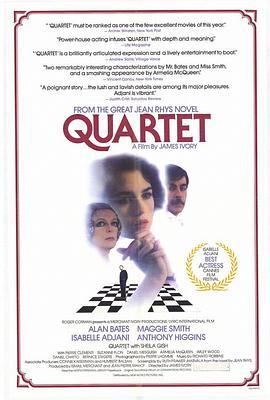
1、问:四重奏什么时候上映时间?
答:这部影片的上映时间是1981年
2、问:四重奏爱情片在哪个电视台播出?
答:四重奏目前只有网上如腾讯视频、爱奇艺、优酷、5557影视等播出,没有在电视台播。
3、问:爱情片四重奏演员表
答:四重奏是由詹姆斯·伊沃里执导。以及阿兰·贝茨,玛吉·史密斯,伊莎贝尔·阿佳妮,安东尼·希金斯领衔主演的爱情片。该剧于1981年在腾讯、爱奇艺、5557影视、优酷、等平台同步播出。
4、问:哪个平台可以免费看四重奏全集
答:免费vip在线观看地址https://www.zjsthj.com/wu-38795.html
5、问:手机版免费在线观看四重奏有哪些网站?
答:hao123影视、百度视频、手机版5557影视、PPTV、电影天堂
6、问:四重奏评价怎么样?
Mtime时光网网友评价:视频制作精良,视觉效果震撼,剧情紧凑扣人心弦。创意新颖,每个镜头都充满力量,音效配合得天衣无缝,看完意犹未尽,强力推荐!
丢豆网网友评论:詹姆斯·伊沃里导演的作品,有欢笑、有泪水、有喜悦、有悲伤...,虚拟世界中的感情是多彩的,并不同于我们现实中不爽就一直玩的感觉,虚拟感情的交错,当看完之后会觉得更加舒畅。
豆瓣电影网友:《四重奏》不同于其他作品,没有紧迫感、虚浮的情节及杂乱的画面,却在不断教导我们,不像老师家长苦口婆心语重心长的教诲(为遵重在这里我省略掉啰嗦这词)。我们看电影电视剧亦或综艺动漫逗号,往往是融入进去,在不知不觉中去了解这些似乎不容易被我们所发现、所理解的道理。再说近一点,看视频时设身处地会发现这是现实中更近教导的教导!
It has been said that most great twentieth century novels include scenes in a hotel, a symptom of the vast uprooting that has occurred in the last century: James Ivory begins Quartet with a montage of the hotels of Montparnasse, a quiet prelude before our introduction to the violently lost souls who inhabit them.
Adapted from the 1928 autobiographical novel by Jean Rhys, Quartet is the story of a love quadrangle between a complicated young West Indian woman named Marya (played by Isabelle Adjani), her husband Stefan (Anthony Higgins), a manipulative English art patron named Heidler (Alan Bates), and his painter wife Lois (Maggie Smith). The film is set in the Golden Age of Paris, Hemingway's "moveable feast" of cafe culture and extravagant nightlife, glitter and literati: yet underneath is the outline of something sinister beneath the polished brasses and brasseries.
When Marya's husband is put in a Paris prison on charges of selling stolen art works, she is left indigent and is taken in by Heidler and his wife: the predatory Englishman (whose character Rhys bases on the novelist Ford Madox Ford) is quick to take advantage of the new living arrangement, and Marya finds herself in a stranglehold between husband and wife. Lovers alternately gravitate toward and are repelled by each other, now professing their love, now confessing their brutal indifference -- all the while keeping up appearances. The film explores the vast territory between the "nice" and the "good," between outward refinement and inner darkness: after one violent episode, Lois asks Marya not to speak of it to the Paris crowd. "Is that all you're worried about?" demands an outraged Marya. "Yes," Lois replies with icy candor, "as a matter of fact."
Adjani won the Best Actress award at Cannes for her performances in Quartet: her Marya is a volatile compound of French schoolgirl and scorned mistress, veering between tremulous joy and hysterical outburst. Smith shines in one of her most memorable roles: she imbues Lois with a Katherine-of-Aragon impotent rage, as humiliated as she is powerless in the face of her husband's choices. Her interactions with Bates are scenes from a marriage that has moved from disillusionment to pale acceptance.
Ruth Prawer Jhabvala and James Ivory's screenplay uses Rhys's novel as a foundation from which it constructs a world that is both true to the novel and distinctive in its own right, painting a society that has lost its inhibitions and inadvertently lost its soul. We are taken to mirrored cafes, then move through the looking glass: Marya, in one scene, is offered a job as a model and then finds herself in a sadomasochistic pornographer's studio. The film, as photographed by Pierre Lhomme, creates thoroughly cinematic moments that Rhy's novel could not have attempted: in one of the Ivory's most memorable scenes, a black American chanteuse (extraordinarily played by Armelia McQueen) entertains Parisian patrons with a big and brassy jazz song, neither subtle nor elegant. Ivory keeps the camera on the singer's act: there is something in her unguarded smile that makes the danger beneath Montparnasse manners seem more acute.